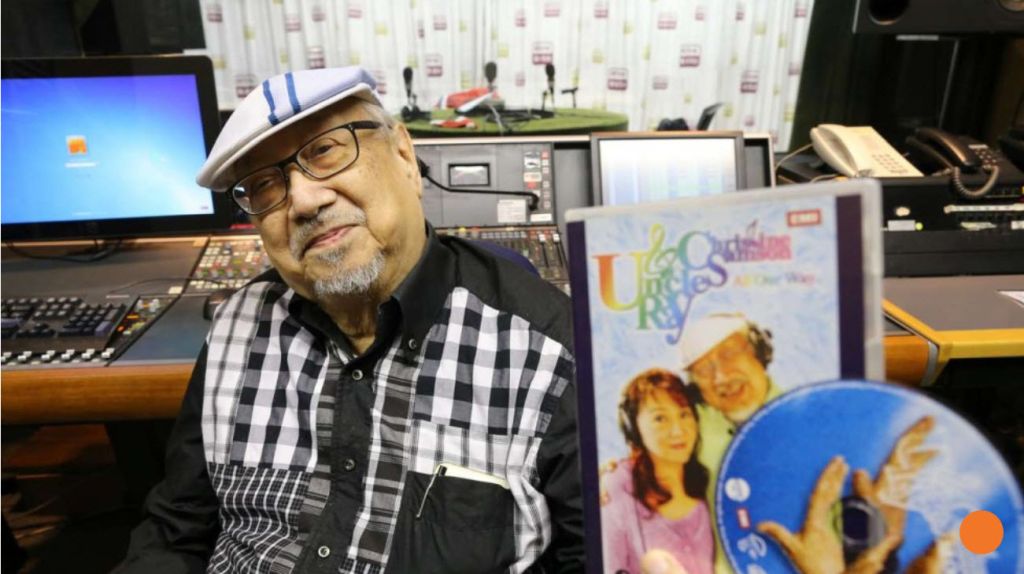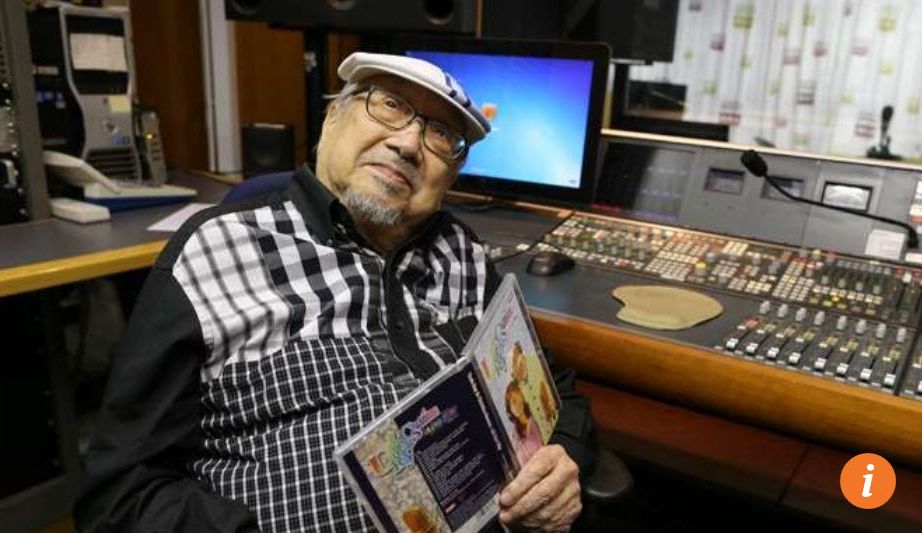'Godfather' of Hong Kong radio still pushing on with his passion for music
DJ with numerous records under his belt says his radio programme on RTHK is his life and that he has no plans to retire
http://www.scmp.com/news/hong-kong/education-community/article/2059924/godfather-hong-kong-radio-still-pushing-his

"Uncle Ray" has been around for so long that even calling him the "Godfather of Hong Kong pop music" is inadequate to fully describe him or honour his illustrious broadcasting career.
"What about 'Great Godfather'?" Ray Cordeiro jokingly suggested. The "Godfather" title was used in his Chinese Wikipedia page, under Kwok Lei-man, his Chinese name.
He was born Reinaldo Maria Cordeiro in Wan Chai on December 12, 1924, the fifth of six children to Luiz and Livia Cordeiro, both of Portuguese descent. His father was from Hong Kong and his mother from Macau.
http://www.scmp.com/news/hong-kong/education-community/article/2059924/godfather-hong-kong-radio-s
"All the Cordeiros are gone. I am the only one left," he said sadly during an interview at a studio at RTHK, where he has been spinning vinyls and CDs since 1960. Before that, he spent 11 years at Rediffusion, a now defunct cable radio service. In 2000, he was recognised as the world's "most durable radio DJ" by the Guinness World Records and he has maintained the record up to this day.
With 67 years of airtime under his belt, the nonagenarian has interviewed a host of musical legends, including Ella Fitzgerald, Duke Ellington, Sarah Vaughan, Patti Page, Frank Sinatra and Paul Mauriat. He also met a few artists, such as the Beatles and Matt Monro, more than once.
Cordeiro was instrumental in nurturing the first generation of local bands and musicians in the 1960s, such as Sam Hui and The Lotus, and Teddy Robin and the Playboys, with The Fabulous Echoes, a band made up of Filipinos, becoming Hong Kong's first pop group to export its music to the West.
His contributions did not go unnoticed, with the radio DJ receiving awards ranging from the MBE (Member of the Most Excellent Order of the British Empire) from the Queen in 1987 to the Bronze Bauhinia Star in 2008 from then Chief Executive Donald Tsang.
The radio guru said he had lost count of the accolades and that he had no plans to retire.
"My life is the daily radio programme, and my fans are very loyal. I just can't desert them," he said. "If I took a day off, they would go: 'Oh, what happened to Uncle Ray?' I only took a day off on my 92nd birthday".
What has kept you going all these years?
I owe it to one person: my mum. She died when she was just 57 years old. Her last words to me were: "No matter where I am and what you do, I will always look after you." So whenever I'm in trouble, I'd look to her for help. An example is two years ago when my former colleague [retired assistant broadcasting chief] Cheung Man-sun invited me to take part in a charity event to play the role of the oldest Santa among 1,000 young Santas. I agreed to it without realising that the event began at 7am at the Peak. It was almost impossible for me not only because I normally get up in the early afternoon [due to] the late show, [but also because] my kidney problem requires regular visits to the toilet. But it's too late to pull out because Cheung told me I would be the centre of attention of the event which aimed at a world record for the number of Santas, old and young. So I spoke to my mum, in tears, asking her to help as she had promised me. The next day, from 7 am to 1pm, I attended the entire event without [needing to answer] the call of nature, not even one drop! That's a miracle. Being a Roman Catholic, I believe in God and I believe in my mum. I don't know [how I have maintained] my voice. As I grow older, I expect it to go weaker, but no, it gets stronger.
How do you feel about breaking the world record every night with your show?
I don't look [to go for any more records with my show], because I hold them all already. So I just love doing what I am doing and hope the listeners love what I am doing. I look forward to it [so much] that the three-hour show passes like nothing.

What happens before and after your three-hour show every weekday from 10pm to 1am?
I usually prepare the songs in the late afternoon. I would draw up a list of songs and singers in an order that alternates male and female artists. In the first hour, I would play pop songs by Elvis Presley, Cliff Richard [and more] and I take phone calls for song requests. Then there's a half an hour newsbreak by 11pm, followed by a "Nostalgia" segment where I play love songs by Perry Como, Doris Day and others. After midnight, Nostalgia will be on FM and that draws more listeners than the AM service. [After the show], I would go for a night bite in Kowloon City. After that, I would watch TV and stay up depending on what's on. I have a habit of drinking two glasses of warm plain water when I get up to clean my system from the things I had before going to bed. I believe that has kept me healthy over the years.
Don't you ever feel lonely?
I never feel lonely in my life as long as there's music in me. I feel fortunate to be able to reach out to people through my shows. My happiest time of the day or in life is when I walk into the studio to do my show where I very much feel at home. Many of my [fellow radio DJs] around the world envy me for being able to play the songs I like. Some have lost their jobs due to a change in format such as playing the top 100 music. I also have many faithful fans; some have been with me for over 50 years. In my younger days, I had a couple of women I had gone out with. But it didn't work out. Maybe they couldn't keep up with my kind of lifestyle which centres around music. There is one now who goes out with me from time to time. She listens to my show every night and gets a lot of her friends to tune in as well.
How do you see the future of radio as a medium?
I still see the radio as a good link between society and people. Listeners nowadays connect through the internet or cellphone, so access to radio service is now easier than before. So long as they have it in their hands, radio has a future. Radio 3, however, is for the AM service only, and that can't reach people who want to listen to it with their cellphones which support only FM. To be honest, I'm very jealous of those DJs on Radio 1 who draw many listeners through FM. I think I would be the happiest DJ if Radio 3 could be on FM one day.
You have been working with young people all along. How do you see the current generation as compared with those in the 1960s?
There were rowdy ones in those days, including teenager [now veteran politician] Emily Lau who tried to grab the microphone from me at my Lucky Dip show at the City Hall Theatre. But overall, young people in the 1960s were more innocent and were not out looking for trouble. I could see that when I played a part in those parties held at Chater Road in the late 1960s after the [1967 leftist] riots. But young people now seem to become too smart for their age. I feel sorry for some of the local universities which have had their image smeared due to the rise of radical students there. I am getting old and I want to live a peaceful life. Please allow Hong Kong to go back to the past where we had peace, love, and good music.
Name a special guest at your programme who you best remember.
Donald Tsang came to my programme in 2010. It was a live show and I remember his motorcade came to Broadcast House with much fanfare. To my surprise, his song list included Nat King Cole instead of classical music. At one point he told me what kept him going and took out a photo of Mother Teresa! [Former chief executive] Tung Chee-hwa was also on my guest list but he was too busy to come. His wife Betty came to me to apologise at a Michael Buble concert and I thought that was very kind of her. As for [Chief Executive] Leung Chun-ying, I once said to him that his deep bass voice would make him a good DJ. He laughed without replying, probably thinking: "Me, a DJ?"
Which chief executive contender would you like to be a guest on your show?
I don't quite like Regina Ip's voice, which is not so natural. As for John Tsang, I used to like him a bit. Judge Woo [Kwok-hing], well, he's okay, but on second thought, he doesn't know too much about Hong Kong. The person I'd like to invite is Carrie Lam. But I won't invite her to sing as she said she doesn't sing a swan song.
When would it be time for your swan song?
It would be the time when my mum says: "I've been watching you too long, you'd better come and join me."
What is your favourite pastime other than music?
I love watching sports – snooker and tennis are my favourites. I go off air at 1am, and often get myself a treat as live events in London, for example, normally start at 3am. Did you watch Marco Fu beating John Higgins at the Scottish Open, live? I did.
You do your night shows on weekdays. What do you do on Sundays?
I enjoy some horse betting. I used to keep a horse, whose name is "We know when" and won a few races. Now that I don't go to the racecourse, I rely on the Racing Post to place my bets. But one Sunday, my copy was taken from my door. I wrote an angry letter and gave a copy to [all the] flats in the building. I even said I'd install a CCTV outside my flat. All my neighbours knew of my fury and told the delivery man the next day, who was so kind as to offer me both the Sunday and Monday editions.
What is your favourite food and why?
Cheung fun (rice noodle rolls) is always my favourite since I was a young student at St Joseph's College in the 1930s. I remember during recess I would go out through the little gate near the Peak tram tracks and buy the hot steamy cheung fun from a hawker there. It's just 10 cents for 12 pieces! And I'd add chilli sauce and all other stuff onto it. What a delicacy. Now they put XO sauce to it and I love it. That's why I feel sad when dai pai dongs (cooked-food stalls) disappear one by one.